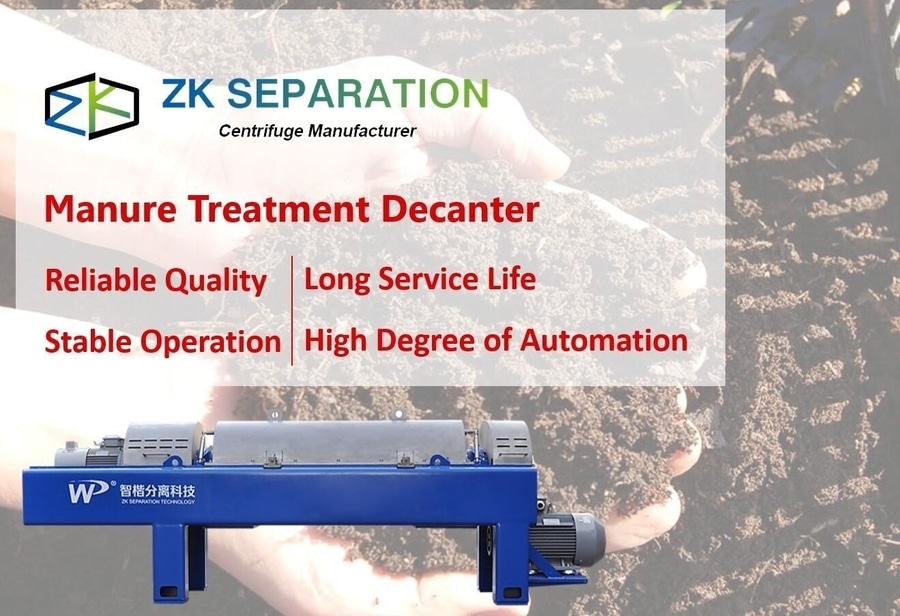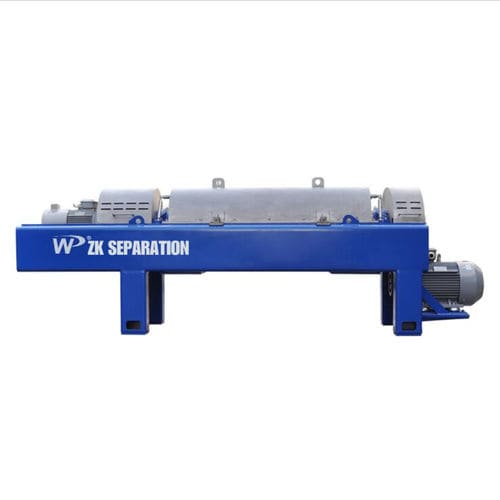
#Product Trends
For Manure Treatment, Decanter Centrifuge Can Save Your Money
manure treatment, manure decanter, liquid manure treatment, manure separation
Why Treat Manure?
If there’s one constant in farming, Poop—and a lot of it. A single horse creates 50 pounds of waste per day; a beef cow up to 92 pounds; a feeder pig 9½ pounds; a sheep 4 pounds; and a laying hen 1/4 pound, according to the Midwest Plan Service’s “Manure Management Series.”
Harm:
All of the farm owners have to face the following problems:
For management, the pollution caused by manure is a huge problem when it comes to the need of meeting government regulations which can result in fines.
For transportation, the liquid manure would greatly increase the burden of transportation which can lead to a very high cost.
For health, toxic gases from manure can lead to respiratory problems in animals. Manure that enters a water source can kill fish and aquatic life quickly, which presents a health hazard to humans and animals downstream that might rely on that water source.
Value:
Manure management is as old as human history and as new as the latest adaptation of a time-honored practice. Proper manure management benefits the producer as well as the rest of the ecosystem.
Manure solids are being composted, often with leaves and grass clippings, to produce soil amendments high in organic-matter content. Lagoons are being covered to capture and use methane and other gases, reduce energy expenditures, control odors, and methane emissions, and produce a manure product with nutrients that are more readily available for plant growth.
Application of manures to the land at the proper time-using proper management techniques and in proper amounts-recycles the nutrients through the soil profile, reducing the expense of commercial (inorganic) fertilizers as well as the need to add organic matter. Proper manure management improves water quality by preventing pollutants such as nutrients, organics, and pathogens from migrating to surface and ground waters. Soil quality is also improved through the addition of organic materials that improve soil tilth and increase the soil's water-holding capacity. Air quality also benefits from reduced emissions of methane and ammonia compounds, as well as reduced odors.
How to Treat Manure?
Animal manure management is complex, combining physical aspects of nature such as rainfall, temperature, and soil characteristics; constructed features such as ponds and waterways; and a concerted management strategy to protect or enhance the ecological setting of the animal enterprise.
Manure management systems encompass six functions: production, collection, storage, treatment, transfer, and utilization. Each function, or combination of functions, is addressed by components specifically designed to meet producers' manure management objectives.
The way manure is handled affects its value as plant nutrients or for other purposes. For example, manure can be kept dry and handled as solids or diluted and handled as liquids, depending on the operator's needs and capabilities. However, the process of treating liquid manure would release the biogas (a common "greenhouse gas") into the atmosphere. So the best way to treat manure is to keep the manure dry by a decanter centrifuge which separates the solid and liquid in the manure.
Why Choose Decanter Centrifuges?
Decanter centrifuges are types of equipment used to efficiently divide the liquid and solid fractions of manure. Mechanical and gravity solid-liquid separation has been traditionally used to reduce lagoon solids buildup by separating solids from liquid raw manure prior to flowing into the anaerobic lagoon or other holding ponds or to recover solids from lagoon sludge.
Solids separation makes the storage of liquid and solids easier and safer by reducing the potential of contaminating surface and groundwater. In addition, solids separation facilitates the use of further methods to recover nutrients that would otherwise be unsuited for use with raw manure.
ZK Decanter Centrifuge Designed for Manure Treatment
ZK’s animal waste centrifuge is a decanter centrifuge specially designed for separating and processing animal liquid manure. Excellent performance in manure and fertilizer management can ensure that animal farms meet environmental protection standards so that the discharged water quality and phosphorus meet regulatory requirements.
The ZK centrifuge is used in the centrifugal dewatering of liquid fertilizers, which can effectively separate liquid manure into solids and irrigation water. The separated solid is odorless and storage is very simple. After subsequent processing, it can be sold as a natural fertilizer. The separated water can be used for plant irrigation. The application of ZK decanter in the treatment of liquid manure can effectively reduce the operating costs of aquaculture enterprises.





